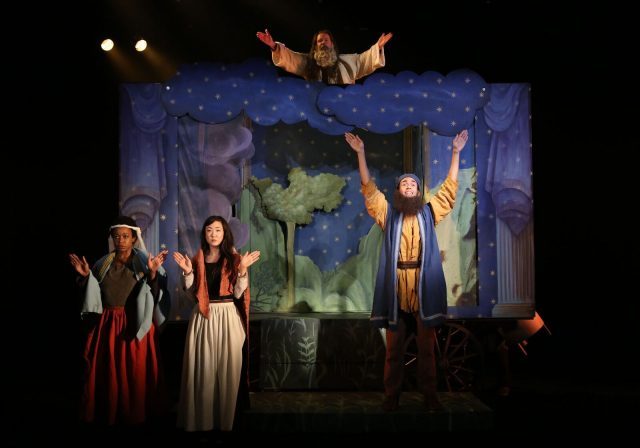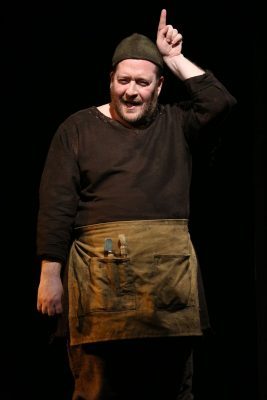
A ragtag troupe tries to survive the plague while putting on a play about Noah’s ark in The Amateurs (photo by Carol Rosegg)
Vineyard Theatre
Gertrude and Irving Dimson Theatre
108 East 15th St. between Union Square East & Irving Pl.
Tuesday – Sunday through March 29, $79-$100
www.vineyardtheatre.org
During the first half of Jordan Harrison’s new play, The Amateurs, which opened tonight at the Vineyard, I found myself wondering just what it was I was watching. Basically, it was about a troupe of amateur actors in fourteenth-century Europe putting on a most amateurish production of Noah’s Flood. Led by Larking (Thomas Jay Ryan), who plays God, the company wants to impress their benefactor, the Duke, so much that he will make them his official troupe and allow them to live in his castle, safe from the Black Death that is sweeping across the land and has already taken one of their own, Henry (Greg Keller). “We’re actors,” Larking declares. “They bury us outside the city walls — and that’s if they like us. So we’ve got to be the best they’ve ever seen, if we want to live.” But alas, they are terrible. So is the first act of The Amateurs a farce? A parable? A historical treatise? Is it purposefully scattershot, or is it a bunch of amateurs making a play about a bunch of amateurs? Just when I was looking for Marshall McLuhan to explain it all to me (see Annie Hall), the narrative comes to a halt and Michael Cyril Creighton, who portrays simple-minded but lovable scenic designer Gregory, steps forward in contemporary dress and identifies himself as the playwright.

Michael Cyril Creighton plays several key parts in The Amateurs at the Vineyard (photo by Carol Rosegg)
“Hi. Hello there,” Creighton says, addressing the audience directly. “The Vineyard Theatre thought it might be a good idea if I talked to you for a little while about, well, Why. It seems that a few ticket holders have been, um, voting with their feet, I guess you would say? And I suggested we could just lock all the doors maybe, or like lightly shame people as they’re trying to leave, but they said No. No, they said. We are all adults and it would be better if you could maybe just contextualize things a little.” And contextualize things he does, delivering a fifteen-minute monologue that goes deep into what might or might not be Pulitzer finalist Harrison’s creative process and personal past, from grammar school to the AIDS epidemic, from Bible study to art history lesson, ingeniously relating the inspiration behind the play, bringing its own drama and tension. At one point, Gregory is joined by Quincy Tyler Bernstine, who plays Hollis in the show-within-the-show; she just about tears the roof off the place with her soliloquy, sharing her feminist views comparing Noah’s unnamed wife to Bob Cratchit’s spouse, Emily, in Charles Dickens’s A Christmas Carol.
And then the magic of theater took complete hold of me. The play travels back to fourteenth-century Europe, where Hollis, Larking, Rona (Jennifer Kim), the Physic (Keller), and Brom (Kyle Beltran) again portray the Seven Deadly Sins, rehearse their terrible show, and meet the Duke’s stalwart major-domo (Beltran). However, whereas in the first act things were bumpy and odd, now every action, every piece of dialogue makes sense. We get the references, we laugh at inside jokes, we applaud the feminist angle, we even care more about the pageant players themselves, as well as the characters they play. We marvel at Harrison’s (Marjorie Prime, Maple and Vine) creative process, we get a kick out of Tony winner David Zinn’s (The Humans, Fun Home) set, which consists of a grassy field, a hill, and a ramshackle cart that serves as the troupe’s mobile stage, and we chuckle knowingly at Raphael Mishler’s strange, Scream-like masks. We appreciate Obie winner Oliver Butler’s (The Light Years, The Open House) tongue-in-cheek direction, guiding us through two time periods and the fourth wall. And we owe it all to Creighton/Harrison, for reminding us of the power of theater, where it comes from, and what it can do for us, especially in dark times.